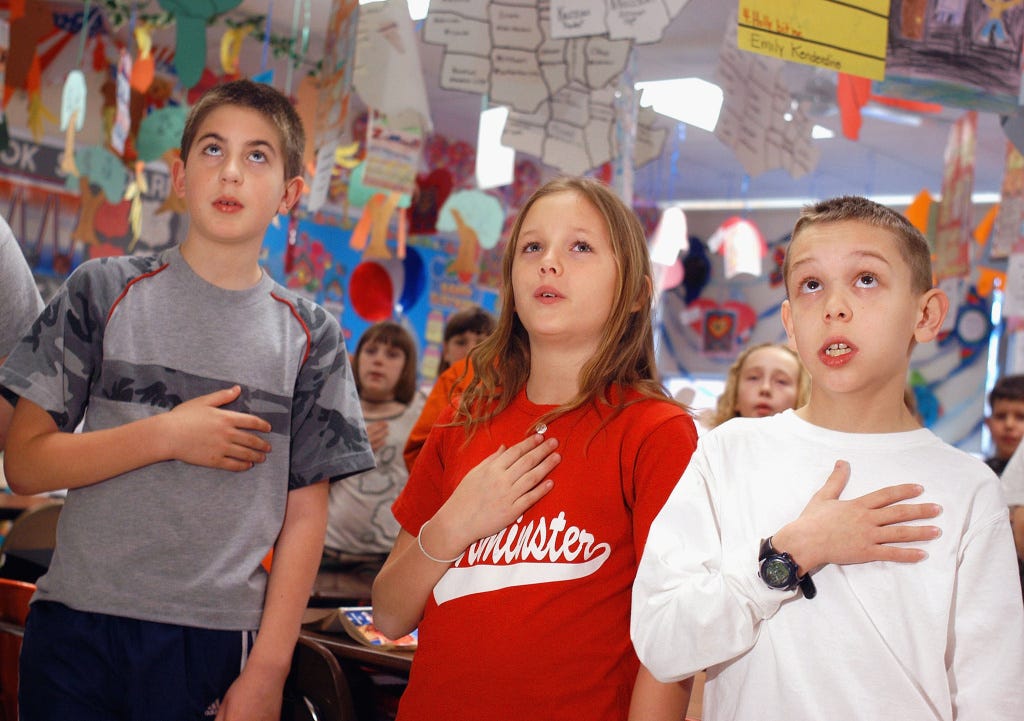The Pledge of Success
A great way for kids to start their day?
In my youth, schools had every kid deliver a daily Pledge of Allegiance. 47 U.S. states still officially require its recitation, but when I ask today’s K-12 kids, they usually tell me that the Pledge of Allegiance is no longer on their school’s agenda. Unlike almost everyone, I oppose patriotism, so my only criticism is that schools are doing the right thing for the wrong woke reasons. But it does make me wonder, “What worldview, if anything, should fill the void?”
Megalomaniacal confession: On some level, I’d like every kid in the world to constantly hear what I think. Alas, that’s beyond the realm of possibility. Question: Is there some valuable set of teachings that is specific enough to merit affirmation, but bland enough to avoid alienating piles of parents? To belabor the obvious, the Orwellian teachings of wokeness fail on both counts.
What, if anything, doubly succeeds? I hereby propose that we teach kids to follow the Success Sequence. Wilcox and Wang succinctly explain the idea:
The “Success Sequence,” a formula to help young adults succeed in America, has been discussed widely in recent years, including by Brookings Institution scholars Ron Haskins and Isabel Sawhill. The formula involves three steps: get at least a high school education, work full time, and marry before having children. Among Millennials who followed this sequence, 97% are not poor when they reach adulthood.
How exactly should we teach the Success Sequence?
For K-6, with common sense.
For higher grades, with a little data.
But for the entire age range, we need repetition.
Repetition repetition repetition repetition repetition repetition repetition repetition.
Repetition is the only effective way to get your point across with most people.
Repetition is the only effective way to get your point across with most people.
Repetition is the only effective way to get your point across with most people.
Deep appreciation of the value of repetition suggests that our classrooms start every day with a Pledge of Success. Which would sound something like:
I pledge to pursue Success,
by making the responsible choices on which it stands:
finishing high school,
working full-time after graduation,
and marrying before having kids.
The first time you say this neo-Pledge, it’s a joke. I’m chuckling as I read it now. Yet every time you say the words, they get less funny. Eventually, the words aren’t funny at all, and they become what they’re meant to be: truisms to help kids become productive adults.
How much would daily recitation of the Pledge of Success actually boost students’ adult success? Hard to say, so I suggest a massive Randomized Controlled Trial to find out.



Art and music fill a child's life in the lower grades. The lesson there is to pursue what you think is fun. How about instead of "I pledge allegiance to the flag . . ." We have them recite this bit of wisdom from Thomas Sowell...
"You make money by doing what other people want, not what you want.”
Honest question. How does this square with your idea that much of high school education is a waste of time? If someone knows ate age 14 that they want to fix cars, why don’t they just starting fixing cars and get started on their 401(k) a few years earlier?
And yet, the data on the success sequence is very strong. This is a fascinating paradox.